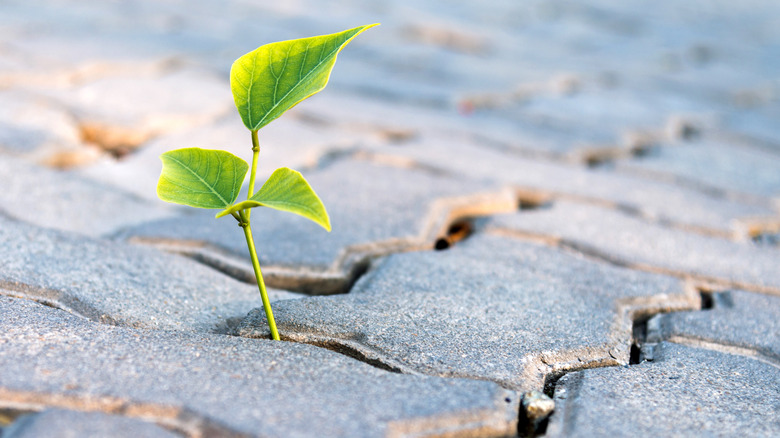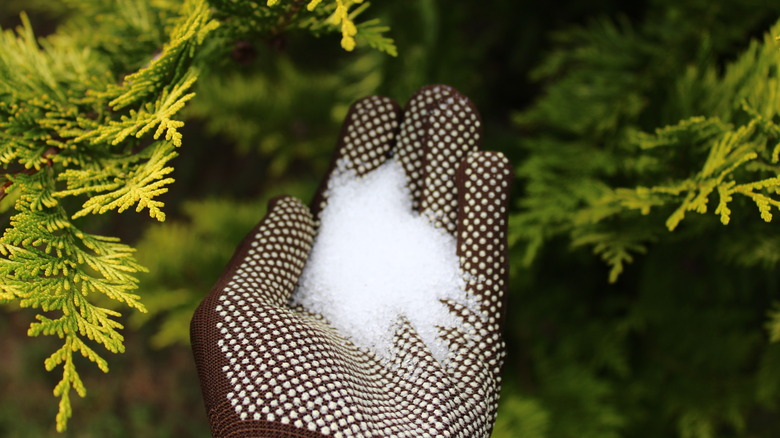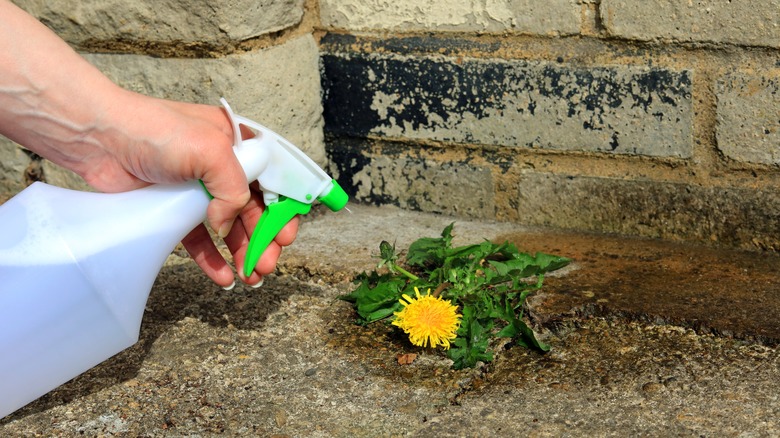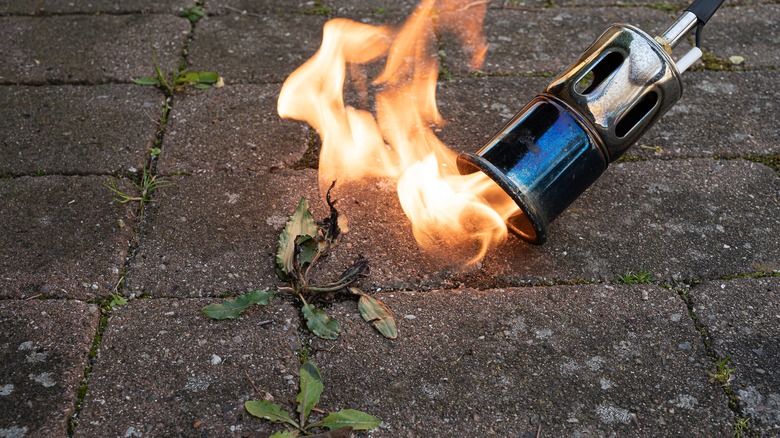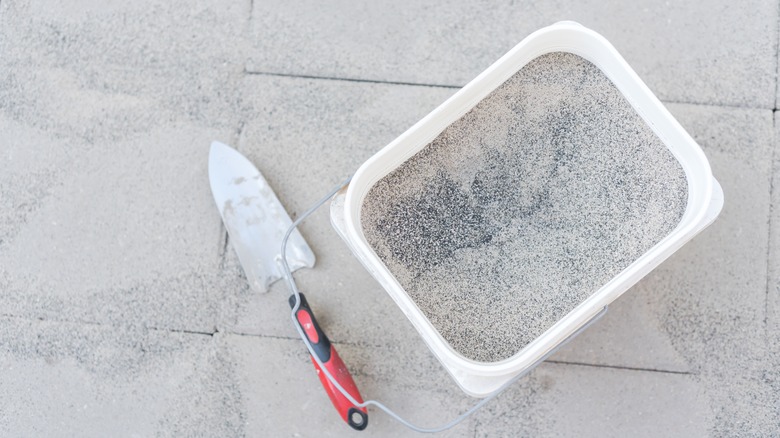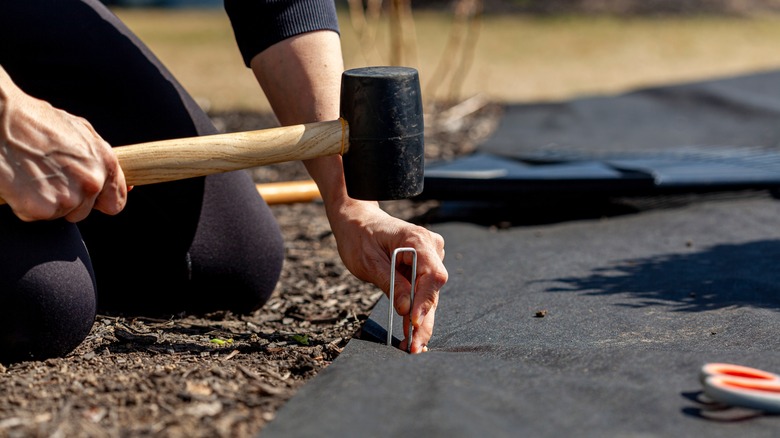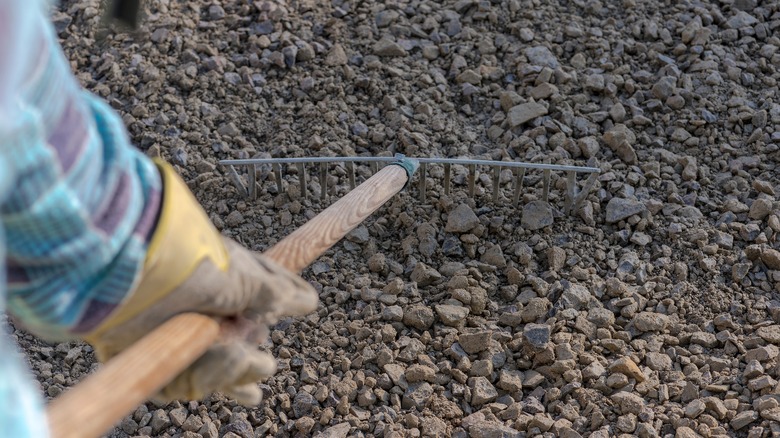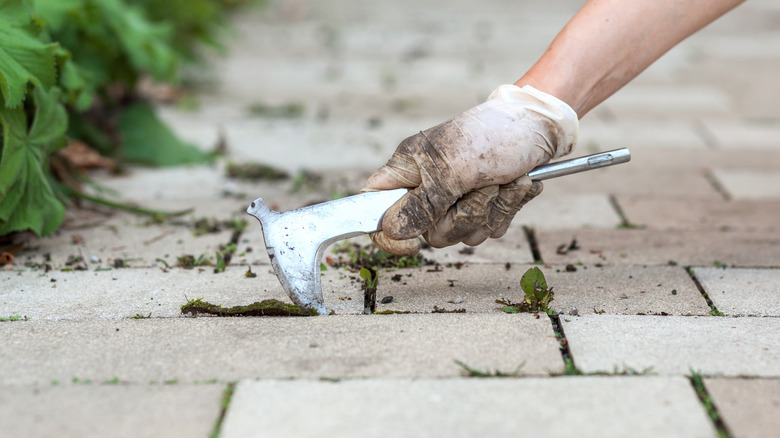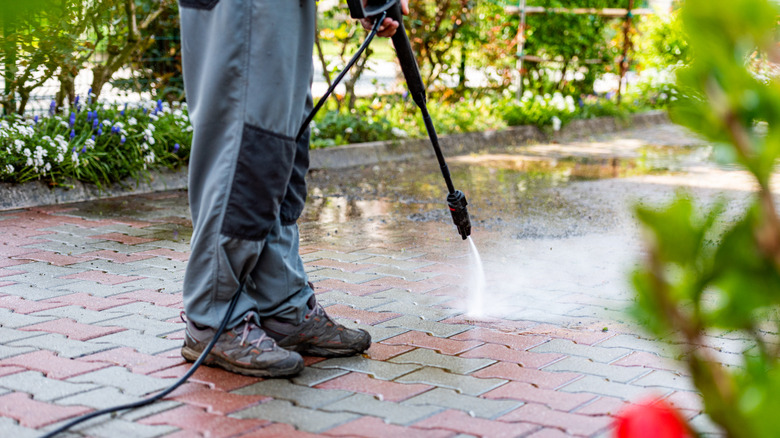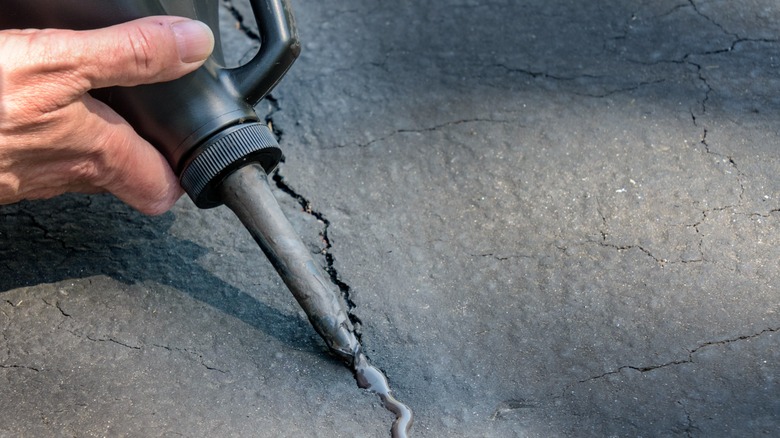12 Ways To Get Rid Of And Prevent Weeds From Growing In Your Driveway
We may receive a commission on purchases made from links.
Weed prevention is no joke; it's a hard job that requires constant vigilance in your garden and lawn. You spend countless hours pulling up roots, mulching, and obsessively searching for effective weed removal hacks to achieve that perfect lawn. So it's no surprise those jerks look elsewhere to set up shop — somewhere even more infuriating for a weed to live, like your driveway. Those little sprigs pushing through tiny cracks can drive anyone crazy, and the damage they can do to your pavers and bricks means you'll need to act fast, or you'll be in for a, literally, bumpy ride.
But we get it; you're busy battling weeds on grass and soil. How are you supposed to know what to do with gravel or asphalt? So, we reached out to some of the top landscape experts out there and asked for their help. Here are a dozen different ways you can combat a weed infestation from wreaking havoc on your driveway. Plus, we've included a little science behind why it works and tips for ensuring you get it right.
Boiling water will cook the weeds from the inside out
If you're looking for an all-natural and free method, look no further than your kettle. Ben McInerney, founder of GoTreeQuotes and a certified arborist with over two decades of experience in landscape management, told House Digest that he prefers to stick to a tried and true method of pouring boiling water directly onto weeds: "Boiling water poured directly onto weeds essentially cooks them from the inside out, denaturing the plant proteins and disrupting cellular functions. It's like giving weeds a fever they can't recover from. I once used this method on a client's gravel driveway in Brisbane, and within 24 hours, the weeds had withered away, leaving behind a pristine surface."
So, what is the science behind boiling water being used to kill weeds, and should you try it? Well, boiling water has been studied extensively around the world and promoted as an effective method for weed control since it's easy to access and cheap. It's best to pour it out of a kettle rather than a pot since it will create a more targeted flow, minimizing the risk of burning yourself. Boiling water is also particularly recommended for driveways and sidewalks, less so for lawns and gardens. That's because the boiling water will kill whatever plant and root system it touches — it won't know the difference between a weed, lawn, or flower cluster. However, boiling water is only really effective for baby weeds as more mature, perennial weeds have stronger roots that will be harder to kill. So if you can catch the growth quickly, douse it with hot water like it's the Wicked Witch of the West. But if it's been living there longer than you have, you might need something stronger.
Use vinegar as a weed desiccant
Let's say boiling water didn't do the trick. No worries, McInerney has a few other tricks up his sleeves. Next up, he recommends trying to control weeds naturally with vinegar. "The acetic acid in vinegar acts as a desiccant, drawing moisture out of the weed leaves and roots. It's like dehydrating the weeds to death." If you have a cluster that just won't die, try adding a drop or two of dish soap to the vinegar to help it adhere to the leaves. "We used this method on a heavily infested driveway in Melbourne, and within a week, the weeds had shriveled up and blown away."
However, there are some caveats to keep in mind. Acetic acid works by, basically, demolishing the cuticles inside a plant's leaf cell structure. The cuticles then leak cells, which results in plant death. Overall, it's a pretty gory-sounding way to go. But here's the thing — for acetic acid to be effective for weed control, you're going to need a heavy concentration. Some experts recommend 10% at minimum, which means you will have to get horticultural vinegar, which usually clocks in at 20% or higher. However, you need to use this very carefully and with proper PPE, such as gloves and eye protection, as it can burn your skin. Household vinegars are usually much lower, maxing out around 5%, but they can still be effective in killing off young, broadleaf weeds. You'll just need to spray them a few times and make sure each spray is a heavy dose.
Salt can be a weed's kryptonite
When all else fails, McInerney recommends going for the nuclear option and pouring salt over the weeds. "Salt may be a dinner table staple, but for weeds, it's kryptonite. When applied to weeds, salt disrupts the water balance within the plant cells, leading to dehydration and eventually death. It's like throwing the weed's internal water management system into chaos." However, he cautions to use this method with caution. "Salt can affect soil quality and might harm nearby plants. We've successfully used salt to create 'no-grow zones' along driveway edges in Perth, creating a barrier that weeds struggle to cross."
Salt works as a weed killer by seeping moisture from its cells, dehydrating it past the point of survival. If you've ever seen Spongebob at Sandy's house, it's like that except, you know, plants. However, as McInerney says, using salt requires serious consideration because you're quite literally salting the earth and creating a dead zone where things won't be able to grow. This can be reversed if the salt is completely washed away, but that could take years. This is why this method is better suited for hardscapes like driveways or sidewalks rather than lawns or flower beds. However, if you decide to use it for the latter, start with a pinch of salt and put it as close to the base of the weed as you can get; you won't need much for it to work.
Create a DIY natural herbicide
According to Jeremy Yamaguchi, CEO of Lawn Love, you can also combine the power of salt and vinegar together to create a pretty potent herbicide. "You can also make an effective DIY weed-killer with a solution that contains apple cider vinegar, dish soap, and Epsom salt. The amounts that I use to make this solution are 1 gallon of apple cider vinegar, 1 ounce of dish soap, and 1 tablespoon of Epsom salt. The vinegar and salt are the agents that attack the weeds the most, while the soap actually works to improve the vinegar's effectiveness." When these ingredients are combined, weeds don't stand a chance.
Yamaguchi's herbicide recipe contains a lot of the tried-and-true ingredients that make an effective weed killer, so we don't have many notes. Apple cider vinegar has a mild acetic acid that can harm plant cells, Epsom salt has the ability to dehydrate whatever cells are left, and dish soap has surfactant qualities that make sure your spray sticks to the plant. Again, though, we want to reiterate that this is a mild herbicide, so you will need to spray a few times for it to truly kill off the whole plant. Try to get as close to the root system as possible and attack the weed as soon as you see it. The younger the plant, the easier it will be to kill.
Flame weeding can be a drastic but effective approach
When all else fails, it's time to break out the fire torches. McInerney explains, "For those who like a more dramatic approach, flame weeding can be incredibly effective. Using a propane torch, you quickly pass the flame over the weeds, causing the water in the plant cells to expand rapidly and burst cell walls. It's like giving the weeds a micro-explosion makeover." However, he warns to have a water source nearby in case things don't blow out as quickly as you would like them to. Yamaguchi is also a fan, telling House Digest, "This method works really well on gravel and concrete driveways, as the flame doesn't harm the materials." It also has the added benefit of being eco-friendly, since there aren't any chemicals or potentially dangerous runoff involved. "Just remember to follow all safety instructions when using such a device, and only use it in safe conditions to avoid unintentional fires."
Flame weeding works similarly to salt because it destroys the plant's cell walls, but it uses heat to do so. However, as both experts point out, flame weeding can be dangerous to you and surrounding plants so be extremely careful if you decide to whip out the blow torch. Don't use this method if you're near landscape fabric or other flammable material like mulch, stay away from irrigation systems, and wear the proper protective clothing to ensure your safety.
Seal cracks with polymeric sand
If you want to keep weeds out of your driveway, McInerney believes you need to make it as unattractive a living space as possible. Polymeric sand is just the thing to make that happen. "Polymeric sand is like kryptonite for these opportunistic invaders. When swept into the gaps between paving stones and activated with water, it hardens into a flexible seal that prevents weed seeds from finding a foothold. We've used this method on numerous driveways across Sydney, and the results are impressive — not a weed in sight for months on end." Brad Saunders, President of Heroes Lawn Care, also told House Digest he's a big advocate for polymeric sand as a weed prevention hack. "This is usually for paver joints, but it works wonders in driveway cracks, too. It forms a solid barrier that keeps weed seeds from taking root." Plus, he notes, if you have a concrete driveway, it will blend in with the design, helping it look clean and maintained.
Polymeric sand is a mixture of polymers and binding agents that are combined with fine sand to create a barrier that prevents pesky weeds from growing between pavers, making it super effective for weed control in driveways. However, there's a catch. Once it dries, it's no longer porous, which is great for weed control but bad for stormwater runoff. Too much runoff can lead to flooding or overloading municipal drains.
Use landscape fabric to prevent weeds on loose stone driveways
Gravel driveways are popular options for homeowners thanks to their cost-effectiveness. But the cost effective feature of gravel driveways comes with a considerable drawback: weeds. No worries, there are solutions; as McInerney told House Digest, "For gravel or loose stone driveways, landscape fabric is your secret weapon against weeds. Laid beneath the surface material, it creates a physical barrier that weeds can't penetrate. It's like laying down an invisible force field that says, 'No Weeds Allowed.'" His company used this method for a large property in Queensland. "The result? A stunning, weed-free driveway that's been the envy of the neighborhood for years."
Landscape fabric comes as a black or grayish woven material, typically polypropylene, that stops weeds from germinating, essentially starving them of the light and air they need for photosynthesis. There's also some evidence that it may increase the temperature of the soil it covers, making it more uninhabitable to weeds, which is all the more beneficial for your driveway. Of course, we still feel like we should state the obvious: landscape fabric is only going to work if you lay it down before installing your gravel driveway. Make sure to secure it with pins to prevent it from moving when pouring the gravel, and consider adding a small edging to the sides as a border to help secure the fabric and prevent loose gravel from escaping.
Add more gravel to stop weeds from breaking through
What about if you already have a gravel driveway installed and can't add landscape fabric? Tom Monson, owner of Monson Lawn & Landscaping, offered House Digest a few ideas. "For a gravel driveway, applying more gravel as needed often prevents weeds." Once you've laid down a new batch of gravel, rake it through; you'll not only level it, but the rake will also act as a makeshift till that can prevent weeds from establishing roots in the soil underneath. Since young weeds have delicate root systems, this will effectively destroy them.
However, this method may not be totally foolproof. "Some may manage to grow anyway. When that's the case, the only option is a weed killer." If that happens, it likely won't be enough to cover the gravel with just one layer of herbicide. "You'll need to spray regularly as new unwanted plants take root," he warns.
Use a hook knife to ensure you get the whole weed
Effective weed control isn't just about getting rid of what you see; it's about getting rid of the whole plant, roots and all. That's why Saunders notes that a hook knife is a must-have item in a homeowner's arsenal. "When you manually remove weeds using something like a hook knife, you're not just getting rid of what's visible. This tool allows you to dig deep into the cracks, pulling out the weeds, roots, and even the soil that could encourage them to grow back. It's a thorough approach, ensuring that you get everything out."
Hook knives (also called weed knives) are awesome and relatively cheap (we found this one by Berry&Bird on Amazon for $13.67). Their narrow blades are great for getting into thin crevices like between paving stones, and their hooked blade design helps pull up the root system, giving you the best bet for keeping weeds gone for good. Make sure to wear proper work gloves and goggles for safety, as those knives can be sharp when they're new.
Try a pressure washer for something more hands-off
If you're someone who can't get down and dirty, Saunders recommends pulling out the pressure washer to give weeds a powerful burst of weed-killing water. "If you're looking for something less hands-on, a pressure washer can be a great alternative. It effectively blasts away both the weeds and any debris in the cracks, making it much harder for weeds to return." Plus, it's also a way to keep up with regular weed control. "Regular maintenance with a pressure washer is a simple yet effective way to keep your driveway weed-free. By routinely cleaning the cracks, you're ensuring that no new seeds can find a place to settle." By keeping the area clean of debris, you're ensuring that no wayward seeds blown in by the wind or dropped by birds can take root. "It's like nipping the problem in the bud before it starts, and it goes a long way in maintaining that clean, weed-free look over time."
While we couldn't find any scientific studies to corroborate the effectiveness of pressure washing as a form of weed control, we found anecdotal evidence on social media that showed people having fun blasting weeds away with pressure washers. In addition, the Bureau of Land Management recommends pressure washing tools to stop weeds from leaving a contamination site, so it can be a solid prevention tool. However, while the high-power water spray would definitely demolish a young weed, you may want to hit the area with a hook knife if there is a large, established weed with deep roots.
Seal cracks with a self-leveling sealant and a backing rod
Like our experts have said, weeds can be opportunists that grow in any crack they find. That's why Saunders advocates for filling cracks in with a combination of self-leveling sealant and backing rods. "After you've cleaned out the area, you place the backer rod in the crack and apply the sealant over it." This is great for hardscapes because the sealant is flexible. "It can handle the natural expansion and contraction of your driveway without cracking. This means no more dirt or seeds getting in, so the weeds don't stand a chance of coming back."
Crack sealing not only helps prevent weeds, but it may also increase the lifespan of your driveway because it stops moisture from seeping underneath the pavement. The less moisture, the less chance for cracks to grow or new cracks to form, which means fewer spots for weeds to move in. While there are a number of options you can use for fixing driveway cracks, Saunders' recommendations for backing rods and self-leveling sealant are easy to get. We went on Amazon and found this Coengwui backer rod for $6.80 and Silkaflex asphalt sealant for $8.90. Don't feel intimidated if this is your first time doing something like this; it's easy to apply paver sealer to patios and driveways once you understand the process.
